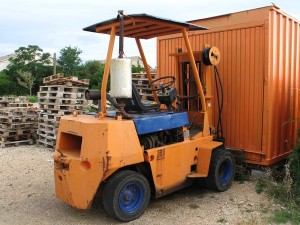
SafeWork South Australia at http://www.safework.sa.gov.au/ has some handy information that all employers that operate a forklift should know:
PCBU: REDUCING THE RISKS
You are responsible for providing:
- A safe work environment
- Safe systems of work
- Safe and well-maintained machinery
- Proper information, training and supervision.
Combined with the principles of hazard management and an effective traffic management plan, these measures can help reduce the risk of forklift-related injuries.
Choosing a safe forklift is one of the most obvious ways to reduce the risk of a forklift-related injury.
WORKERS: REDUCING THE RISKS
You also have responsibilities to ensure safe workplace including by:
- Working with the PCBU and co-workers to improve safety;
- Complying with reasonable instructions, training and information given, and following safe work procedures to do your work;
- Not putting yourself or your co-workers at risk;
- Reporting incidents, near misses and hazards (including unsafe equipment) to your PCBU or supervisor and health and safety representative; and
- Using protective equipment correctly.
QUALIFICATIONS AND TRAINING
To operate a forklift you must have a high risk work licence or be closely supervised while you are getting a high risk work licence. A high risk work licence requires you to be first trained by a Registered Training Organisation. Check with your local workplace safety authority for requirements in your state or territory.
TRAINING
Training must be provided by a Registered Training Organisation and in the workplace under the competent supervision by a person with the same high risk work licence.
Records of training (a logbook) must be maintained while you undertake your training.
Registered Training Organisations provide logbooks to record training. Records should reflect the type of training undertaken to evidence both theory and practical training.
The operator should be competent to operate a forklift in the particular environment in which they are required to work. Specific skills require additional training. For example, before an operator starts using a forklift or an attachment that is different to the one used for training and gaining qualifications further training and supervision is required.
QUALIFICATIONS
Independent accredited assessors will evaluate skills against a national instrument of assessment.
Having a qualification indicates you have the basic knowledge and skills to operate a forklift without danger to yourself or others. More specific skills are necessary for specialised forklift types, attachments and worksite characteristics.
A standard age limit applies wherever you operate a forklift in Australia. A person wishing to be assessed for operation of a forklift must be 18 years of age. Contact your local work health and safety authority for further information about the age requirement to operate a forklift.
If you do not hold a qualification, you can only operate a forklift under the direct supervision of an appropriately qualified forklift operator or assessor who holds the relevant qualification. Direct supervision means that the qualified forklift operator or assessor must be close enough that they can see what you are doing and provide appropriate verbal instruction.
When you operate and/or drive a forklift on a public road, you must hold a current driver’s licence and the forklift must be registered.
Source: http://www.safework.sa.gov.au/uploaded_files/forklift_safety.pdf
The SafeWork South Australia Forklift Guide is a comprehensive guide that covers safety and legal requirements and can be downloaded and printed so that it can be available for employers and workers at the worksite.



